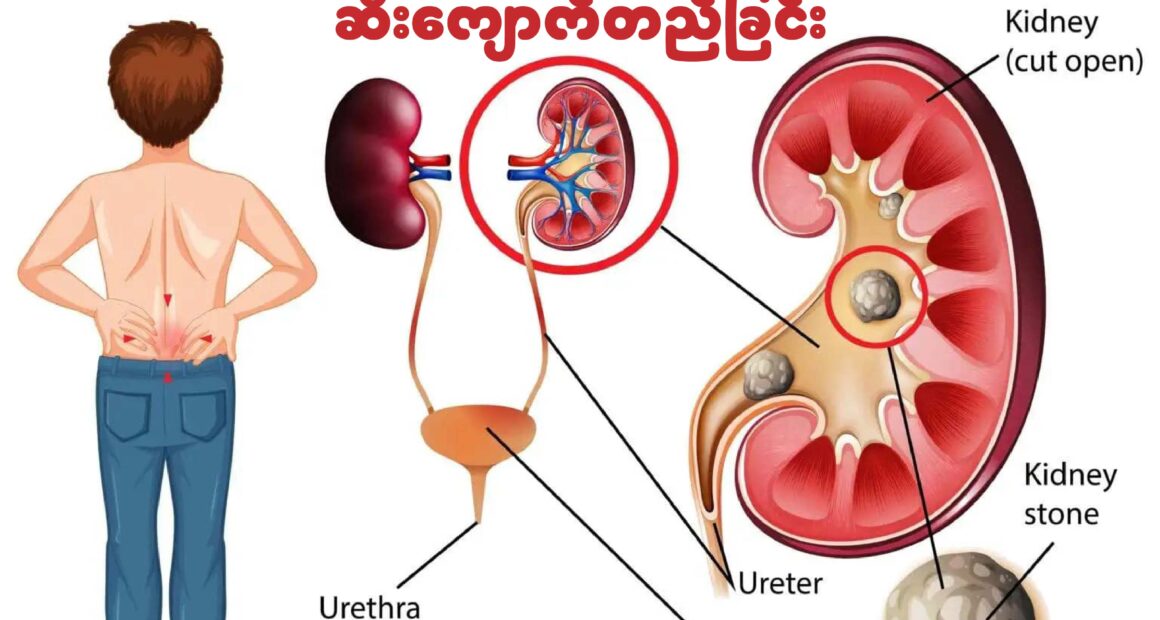In the clinic, we are seeing more patients with kidney stones, so I’ve written this informative article. To explain how kidney stones form: when the levels of salts and minerals in the urine increase, crystallization occurs. These excess salts and minerals gradually accumulate and form solid particles, leading to kidney stone formation. Most kidney stones are primarily composed of calcium salts. Stones can be found throughout the urinary tract, which includes the kidneys, ureters, and bladder.
The salts that contribute to kidney stones include calcium oxalate, uric acid, cystine, magnesium, ammonium, and phosphate. Based on the types of these salts, kidney stones can be classified. Stones formed from calcium oxalate are called calcium oxalate stones, while those from uric acid are called uric acid stones. Stones resulting from the combination of magnesium, ammonium, and phosphate are referred to as struvite stones. Additionally, stones that arise from a combination of calcium and phosphate salts are called mixed stones. Mixed stones, which are often formed from calcium oxalate, are commonly encountered.
Factors That Promote Kidney Stone Formation
- Individuals over 40 years old
- Males (especially those with urinary tract infections)
- Those with a family history of kidney stones
- Individuals with high meat consumption
- Those with excessive intake of salt, sugar, and sweets
- People who drink little water or tend to hold urine for long periods
- Individuals with certain medical conditions
- Obese individuals
- Those who experience sudden weight loss or undergo bariatric surgery
- Patients on certain cancer medications or urinary drugs. Long-term use of calcium and vitamin D has been reported to increase the risk of kidney stones by 17%.
- Drinking water high in fluoride
- Individuals who have had urinary catheters, urinary tract surgeries, or radiation therapy are at higher risk.
About 80% of kidney stones are composed of calcium. Struvite stones typically occur in the presence of infection, which is why they are also known as infection stones.
Symptoms
The symptoms depend on the size and location of the stones. Smaller stones (under 3mm) often pass without causing symptoms. Larger stones can cause blockages in the urinary tract, leading to:
- Severe pain (which can radiate to the lower abdomen and groin; the pain may last for hours and then subside, but can recur)
- Nausea
- Blood in the urine
- Frequent urination or a burning sensation during urination
- Fever or chills
If left untreated, kidney stones can lead to complications such as urinary tract infections, inflammation, and impaired kidney function.
Diagnostic Tests
Diagnosis involves taking a thorough medical history and asking about symptoms, along with:
- Ultrasound
- X-rays
- CT scans
- MRIs
- Blood tests
- Urine tests
Treatment
Treatment depends on the condition, size of the stones, and the patient’s overall health. Small stones (less than 5mm) that are asymptomatic can often pass on their own, and patients are advised to increase fluid intake and monitor their condition. Pain relief medications may be necessary. For larger stones (over 5mm), the chances of passing them spontaneously are low, and treatment may involve medications or procedures to remove the stones, depending on the severity.
Preventive Measures
- Drink plenty of water.
- Staying hydrated helps dilute urine and reduce the risk of stone formation. Studies suggest that consuming about 3 liters of water daily can help prevent kidney stones.
- Reduce salt intake.
- Sodium can cause the body to retain water, which may lead to concentrated urine and increased stone formation. It’s recommended to limit salt intake to about one teaspoon per day.
- Maintain a healthy weight.
- Obesity increases pressure on the kidneys, making it more difficult for them to eliminate waste.
- Limit foods high in calcium oxalate.
- Foods such as spinach, potatoes, peanuts, chocolate, and tea should be consumed in moderation.
- Avoid alcohol.
- Alcohol can dehydrate the body and increase the risk of stone formation.
- Reduce caffeine intake.
- High caffeine consumption can contribute to dehydration, so it’s advisable to limit intake.
- Individuals with uric acid stones should limit red meat consumption, as it can increase uric acid levels in the urine.
- Avoid certain foods.
- Limit coffee, tea, processed foods, salt, sugar, and high-fat foods. Excessive intake of red meat and alcohol should also be avoided.
It’s important not to use medications without proper guidance. Overuse of vitamin C, vitamin D, certain pain medications, and antacids can increase the risk of stone formation.


















